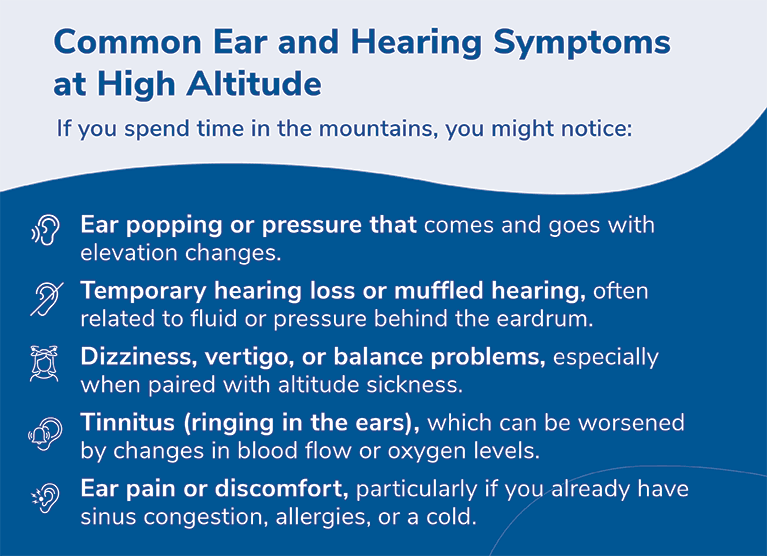Hearing Health Tips for High-Altitude Regions
When most people think about visiting or living in high-altitude regions, they imagine stunning views, crisp mountain air, and plenty of outdoor adventure. What many don’t realize is that living or vacationing at higher elevations can also affect hearing health.
Altitude changes don’t just impact your lungs and stamina—they can also affect your ears. If you’ve ever felt your ears “pop” while driving through the mountains or flying on a plane, you’ve already experienced the pressure-related effects that come with elevation changes. But when you spend significant time at higher altitudes, your ears may face more challenges than you expect.
In this guide, we’ll explore how high-altitude environments can affect your hearing, what symptoms to look out for, and how to keep your hearing healthy.
Why Altitude Affects Your Ears
Your ears are finely tuned to changes in pressure, balance, and oxygen levels. At high altitudes—typically considered 8,000 feet (2,400 meters) and above—the environment is dramatically different than at sea level.
Key Factors That Influence Hearing at High Altitudes:
Air Pressure Changes: The middle ear contains the Eustachian tube, which equalizes air pressure on either side of the eardrum. At higher elevations, rapid pressure changes can make this process harder, leading to ear fullness, muffled hearing, or discomfort.
Reduced Oxygen Levels: Higher altitudes mean thinner air and lower oxygen availability. Some studies suggest that reduced oxygen may temporarily affect the inner ear, which plays a crucial role in hearing and balance.
Dry Air: Mountain air tends to be much drier than at sea level. This can dry out the delicate tissues in the ear canal, leading to irritation or an increased risk of earwax impaction.
Cold and Wind Exposure: Outdoor activities like skiing, hiking, or climbing can expose ears to cold, dry wind, which may cause irritation or increase the risk of infections.
Noise Exposure: Many high-altitude adventures—snowmobiles, ski resorts, helicopters, or mountain machinery—come with loud sounds that can contribute to noise-induced hearing loss if you’re not protected.

Common Ear and Hearing Symptoms at High Altitude
If you spend time in the mountains, you might notice:
- Ear popping or pressure that comes and goes with elevation changes.
- Temporary hearing loss or muffled hearing, often related to fluid or pressure behind the eardrum.
- Dizziness, vertigo, or balance problems, especially when paired with altitude sickness.
- Tinnitus (ringing in the ears), which can be worsened by changes in blood flow or oxygen levels.
- Ear pain or discomfort, particularly if you already have sinus congestion, allergies, or a cold.
In rare cases, extreme altitude exposure can contribute to barotrauma (damage to the middle ear from pressure changes) or high-altitude cerebral/inner ear edema, though these are uncommon and usually related to very high climbs (above 12,000–15,000 feet).
Hearing Health Tips for High-Altitude Regions
Whether you’re planning a mountain getaway or you live year-round at higher elevations, these tips can help protect your ears and keep your hearing strong.
Stay Hydrated
Dehydration is one of the most common altitude-related issues, and it affects your ears too. Drink plenty of water to keep your body and ear tissues hydrated, reducing dryness and discomfort.
Equalize Pressure Safely
If you feel pressure building in your ears:
- Try swallowing, yawning, or chewing gum.
- Use the gentle Valsalva maneuver: close your mouth, pinch your nose, and exhale softly to help open the Eustachian tubes.
- Avoid aggressive pressure equalizing (forceful nose-blowing), which can damage your eardrum.
Manage Congestion Before You Go
If you have a cold, allergies, or sinus congestion, your ears may struggle more with altitude changes. Consider decongestants (if safe for you), nasal sprays, or allergy medications before heading up the mountain.
Protect Your Ears from the Elements
Cold winds and dry air can be hard on your ears. Protect them with:
- Ear muffs, headbands, or ski helmets with ear covers.
- Moisturizing drops or mineral oil to prevent dry, itchy ear canals (avoid if you have ear tubes or a history of eardrum perforation).
Use Hearing Protection Around Noise
If you’re snowmobiling, skiing near loud machinery, or taking a helicopter ride, wear earplugs or noise-reducing earmuffs. Protecting your hearing in noisy mountain environments is just as important as at a concert or construction site.
Acclimate Gradually
If possible, ascend gradually to higher altitudes. This gives your body—including your ears—time to adjust to pressure and oxygen changes.
Be Mindful of Hearing Aid Care
If you wear hearing aids:
- Store them in a dry kit or dehumidifier overnight to combat dryness and cold.
- Keep spare batteries or ensure your rechargeable case is fully charged—cold weather can drain batteries faster.
- Clean them regularly to avoid wax buildup, which may worsen in dry conditions.
Watch for Warning Signs
Seek medical or hearing care if you experience:
- Severe ear pain that doesn’t improve.
- Sudden hearing loss.
- Persistent dizziness or vertigo.
- Intense ringing in the ears.
- Fluid drainage from the ear.
Who’s Most at Risk?
Some people may be more vulnerable to ear problems at high altitude, including:
- Children, whose Eustachian tubes are narrower and more prone to blockage.
- People with chronic sinus issues or allergies.
- Those recovering from ear infections.
- Frequent travelers or residents moving between sea level and mountain environments.
- Individuals with existing hearing loss or tinnitus, which altitude may temporarily worsen.

Long-Term Hearing Health in High-Altitude Living
If you live in a high-altitude region full-time, your ears eventually adapt to the environment. But over the long term, you’ll want to take extra steps to protect your hearing:
- Schedule regular hearing screenings to monitor changes.
- Address recurring ear problems early to prevent long-term damage.
- Invest in high-quality hearing aids designed for durability and performance in variable climates.
- Maintain overall wellness, including cardiovascular and respiratory health, which supports oxygen supply to the inner ear.
Enjoy the Mountains, Protect Your Hearing
High-altitude living and travel offer incredible opportunities—from skiing and snowboarding to hiking and stargazing. By paying attention to your ears and following these hearing health tips, you can reduce discomfort, protect your hearing, and fully enjoy everything the mountains have to offer.
At Beltone, our hearing care professionals are here to help you navigate every environment—from sea level to summit. Whether you need tips for managing altitude changes, or personalized support with hearing aids, we’re ready to help.

Book Your Free Appointment


